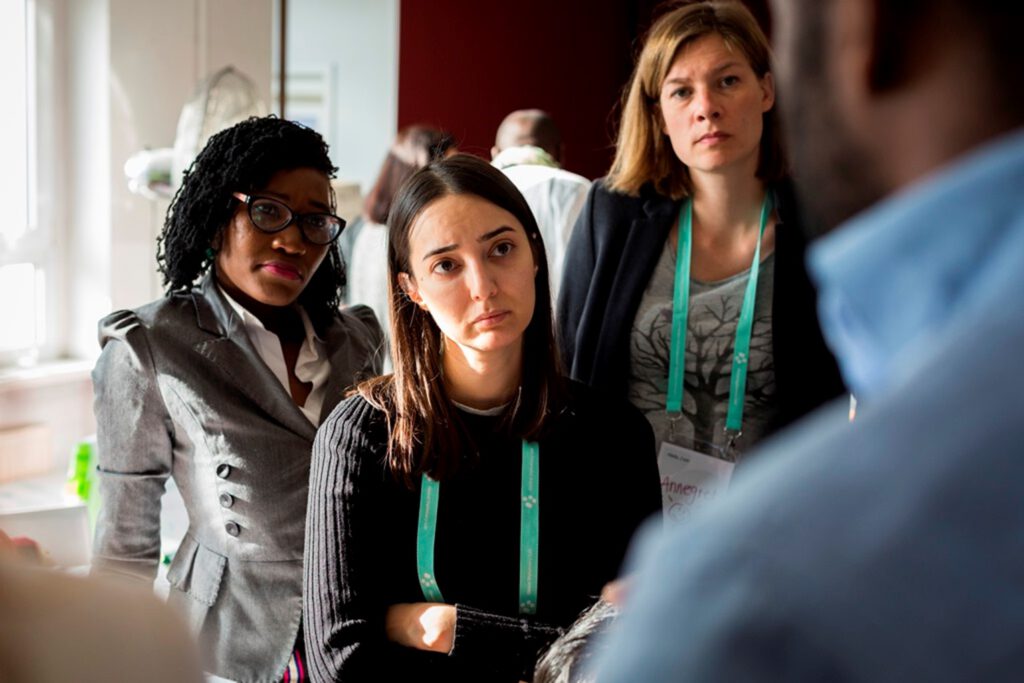Blog
The EU Needs a Language Shift and Instruments to Tackle Fake News
GDL members Elif Çavuşlu and Burak Ünveren are contributing to the Bled Strategic Forum from 31 August to 2 September 2021 in Bled, Slovenia with two interactive sessions. They are setting the scene with two thought-provoking articles for the Bled Strategic Times on why communication and information are so important for functioning democracies and political participation.
We need to talk about Europe – Addressing the EU’s communication deficit
By Elif Çavuşlu
At the beginning of Elif’s article the EU’s communication strategy does not fare particularly well. A recent analysis of social media has shown that there is hardly any interaction between the EU and the general population but that mainly “Brussels-based EU actors” engage in online exchange: “So far, around 22,000 individuals and organisations have registered on the CoFoE’s (The Conference on the Future of Europe) digital platform. It is not realistic to expect millions of citizens to start engaging on European issues on social media and the platform but at the same time the current number is worryingly low, as it represents less than 0.005% of the EU population”.
The failed communication strategy is a weakness of the EU and one which stands in stark contrast to its important function. As Elif Çavuşlu writes, “The EU institutions and leaders have been convinced since the early 1990s that for a strong, united and successful EU able to fulfil the vision upon which it has been established, it is necessary to bring the EU closer to its citizens and to engage with them meaningfully”. Otherwise, the European project would also degenerate into an elitist project. Proper communication is incredibly important for a healthy European democracy and the legitimacy of the EU.
“The real challenge is to engage the people who have little knowledge of or interest in EU politics and to demonstrate the EU’s real life impact, value and relevance in the last 30 years (…).” Of course, it is not easy to reach half a billion people with 24 different languages – a task almost too big for the EU institutions, says Elif.
“EU literacy is very low among the general public. Until there is an EU-wide, mandatory European citizenship class, there will always be confusion and lack of understanding about what the EU does and how it does it.”
That’s why CoFoE represents a prime opportunity to change the EU’s communication, to actually listen to its citizens and encourage collective dialogue. That’s how Elif Çavuşlu wishes it would be: “To extend the target of the EU communication from a very specialised audience to a wider public, a language shift is necessary. A clear and simpler language with a focus on the Europe of values and a Europe that has a direct impact on people’s lives has more potential to speak to the hearts and minds of the Europeans”.
You can delve deeper into the topic by reading the full article recently published in the Bled Strategic Times 2021.
Fighting disinformation – The truth is still the truth
By Burak Ünveren
Burak Ünveren emphasises an important aspect when it comes to misinformation: “MIT researchers find that lies spread faster than the truth, owing to their novelty. We won’t be able to decontaminate the European public sphere overnight. It is going to take time and energy”. Fake news and disinformation have been around for a long time in history. Nevertheless, globalisation and technological progress have made it easier and faster to spread disinformation, so that they even “surpassed the boundaries of being a theoretical threat and verifiably determined the fate of many European societies by influencing election and referendum outcomes”.
Our freedom of speech and the possibilities of dissemination are achievements but they can also be used for manipulative purposes. For example, fake news played a role in the Brexit referendum, as well as in the US elections. “Disinformation campaigns and fake news are emerging as a long-term threat to the values and the security of the Transatlantic alliance and the EU, as the line between information and disinformation is fading”, writes Burak Ünveren.
Disinformation would become more and more normalised, even though or precisely because it has been reported and discussed so much. Even though misinformation has become a major international issue, Burak says we should ask ourselves the following questions: “How come the Transatlantic alliance has not been able to efficiently prevent disinformation campaigns before they arrived and infiltrated the European and American public spheres? Are we not capable of disarming these threats beyond our borders? Is disinformation, by its very nature, unstoppable? Or is it that we are just not doing enough?”.
The EU, as a supranational organisation and thus a major player in NATO, also has responsibilities in this area just as we Europeans ourselves do by communicating with each other. Burak comments: “Let’s not forget one thing: The post-truth might be attractive, but the truth is still the truth“.
You can delve deeper into the topic by reading the full article recently published in the Bled Strategic Times 2021.
***Burak’s session on “Fighting Disinformation with Information: Securing Security through Facts” at the Bled Strategic Forum 2021 is organised and conducted in partnership with GDL Leading Partner BMW Foundation Herbert Quandt and will take place on Thursday, 2 September from 4-5.30 pm (CEST). You can follow the livestream on the BSF Homepage. ***
About the authors:
Elif Çavuşlu is an EU affairs expert working for the European Union’s institutions and is actively involved in issues concerning human rights, anti-discrimination and Roma rights in Turkish civil society.
Burak Ünveren is a political scientist and journalist with expertise in the fields of global affairs, international security, Turkish foreign policy, political communications and German-Turkish relations.
Published on August 31, 2021.
Photo credit: Mark Beckmann
